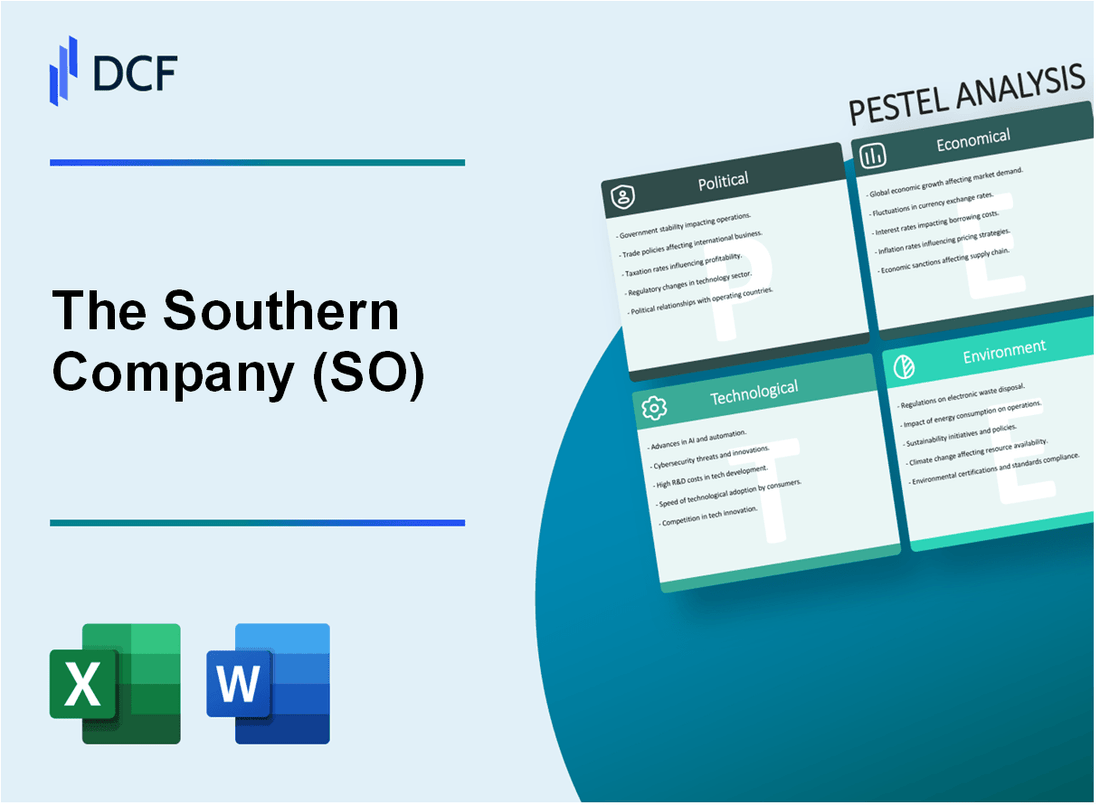
|
The Southern Company (SO): Stößelanalyse [Januar 2025 aktualisiert] |

- ✓ Fully Editable: Tailor To Your Needs In Excel Or Sheets
- ✓ Professional Design: Trusted, Industry-Standard Templates
- ✓ Pre-Built For Quick And Efficient Use
- ✓ No Expertise Is Needed; Easy To Follow
The Southern Company (SO) Bundle
In der dynamischen Landschaft der Energieversorgungsunternehmen ist das südliche Unternehmen ein zentraler Spieler, der komplexe politische, wirtschaftliche und technologische Gebiete navigiert. Diese umfassende Stößelanalyse enthüllt die vielfältigen Herausforderungen und Chancen, denen sich dieser südöstliche Energieriese gegenübersieht, und zeigt, wie strategische Anpassungsfähigkeit und innovative Ansätze in einer zunehmend volatilen Industrie von entscheidender Bedeutung sind. Vom regulatorischen Druck bis hin zu Übergängen für erneuerbare Energien spiegelt die Reise des südlichen Unternehmens das komplizierte Gleichgewicht zwischen der traditionellen Stromerzeugung und den dringenden Anforderungen nachhaltiger, nachdenke Energielösungen wider.
Die Southern Company (SO) - Stößelanalyse: Politische Faktoren
Regulierter Versorgungssektor mit erheblichen staatlichen Interaktionen auf staatliche Ebene
Das Southern Company ist in einem komplexen regulatorischen Umfeld in mehreren Bundesstaaten tätig, darunter Alabama, Georgia, Mississippi und Florida. Ab 2024 verwaltet das Unternehmen 4 regulierte Stromversorger und 2 regulierte Erdgasverteilungsunternehmen.
| Zustand | Regulierungskommission | Regulierungsaufsicht |
|---|---|---|
| Alabama | Commission für öffentliche Dienstleistungen in Alabama | Vollständige Ratenregulierung |
| Georgia | Georgia Public Service Commission | Umfassende Aufsicht |
| Mississippi | Mississippi Public Service Commission | Ratenüberprüfung und Genehmigung |
Potenzielle Politikverschiebungen in den Vorschriften für saubere Energie und Kohlenstoffemissionen
Das südliche Unternehmen hat bis 2025 Clean Energy -Investitionen in Höhe von 11,5 Milliarden US -Dollar begangen, was auf erhebliche Reduzierung von Kohlenstoffemissionen abzielt.
- Ziele zur Reduzierung von Kohlenstoffemissionen: 50% bis 2030
- Portfolio für erneuerbare Energien: 8.000 MW bis 2027
- Netto-Null-Emissionsziel: 2050
Navigieren komplexe Landschaften des Bundes und der staatlichen Energiepolitik
Das Unternehmen ist mit mehreren Bundesbehörden, einschließlich des Ministeriums für Energie- und Umweltschutzbehörde, miteinander.
| Bundesbehörde | Interaktionsfokus | Regulatorische Auswirkungen |
|---|---|---|
| FERC | Übertragungsinfrastruktur | Preis- und Zuverlässigkeitsvorschriften |
| EPA | Emissionskonformität | Durchsetzung der Umweltstandards |
Fortlaufendes Engagement mit Aufsichtsbehörden
Das südliche Unternehmen unterhält ein aktives regulatorisches Engagement in mehreren Gerichtsbarkeiten, wobei die jährlichen Ausgaben für die Einhaltung von Vorschriften auf 125 Mio. USD geschätzt werden.
- Jährliches Budget für die Einhaltung von Vorschriften: 125 Millionen US -Dollar
- Aufsichtsbehörden teilgenommen: 42 im Jahr 2023
- Regulierungsinterventionsstrategien: Proaktive Richtlinienausrichtung
Die Southern Company (SO) - Stößelanalyse: wirtschaftliche Faktoren
Stabile Umsatzerzeugung durch regulierte Strommärkte
Das südliche Unternehmen meldete 2022 einen Gesamtbetriebsumsatz von 26,9 Milliarden US -Dollar, wobei eine konsistente Einnahmequelle von regulierten Strommärkten ausgewiesen wurde. Das regulierte Versorgungssegment des Unternehmens erzielte einen Umsatz von 24,3 Milliarden US -Dollar.
| Finanzmetrik | 2022 Wert | 2021 Wert |
|---|---|---|
| Gesamtbetriebserlöse | 26,9 Milliarden US -Dollar | 24,1 Milliarden US -Dollar |
| Regulierte Versorgungseinnahmen | 24,3 Milliarden US -Dollar | 21,8 Milliarden US -Dollar |
Exposition gegenüber Zinsschwankungen, die die Infrastrukturinvestitionen beeinflussen
Die langfristige Schulden des südlichen Unternehmens belief sich zum 31. Dezember 2022 bei 45,2 Milliarden US-Dollar. Der gewichtete durchschnittliche Zinssatz für langfristige Schulden betrug im Jahr 2022 bei 4,23%.
| Schuldenmetrik | 2022 Wert |
|---|---|
| Langfristige Schulden | 45,2 Milliarden US -Dollar |
| Gewichteter durchschnittlicher Zinssatz | 4.23% |
Fortsetzung des Wirtschaftswachstums in den Dienstgebieten der südöstlichen Vereinigten Staaten
Die Southern Company dient Territorien in Alabama, Georgia, Florida und Mississippi. Zu den wichtigsten Wirtschaftsindikatoren für diese Staaten gehören:
| Zustand | BIP -Wachstumsrate (2022) | Arbeitslosenquote (Dezember 2022) |
|---|---|---|
| Alabama | 3.2% | 2.7% |
| Georgia | 3.7% | 3.1% |
| Florida | 4.1% | 2.5% |
| Mississippi | 2.9% | 3.4% |
Mögliche Auswirkungen der Inflation auf die Betriebs- und Investitionsausgaben
Die Investitionsausgaben des südlichen Unternehmens im Jahr 2022 beliefen sich auf 6,5 Milliarden US -Dollar. Die Auswirkungen auf die Inflation spiegelten sich in erhöhten Betriebskosten wider:
| Ausgabenkategorie | 2022 Wert | Veränderung des Jahres |
|---|---|---|
| Investitionsausgaben | 6,5 Milliarden US -Dollar | +8.3% |
| Betriebs- und Wartungskosten | 5,8 Milliarden US -Dollar | +6.9% |
Die Southern Company (SO) - Stößelanalyse: Soziale Faktoren
Wachsende Verbrauchernachfrage nach erneuerbaren und nachhaltigen Energiequellen
Das südliche Unternehmen meldete ab 2023 eine Kapazität von 6.256 MW erneuerbarer Energien. Die Solargenerierung stieg gegenüber dem Vorjahr um 42%. Investitionen für erneuerbare Energien erreichten 2023 2,3 Milliarden US -Dollar.
| Metrik für erneuerbare Energien | 2023 Wert |
|---|---|
| Gesamt erneuerbare Kapazität | 6,256 MW |
| Solargenerierungswachstum | 42% |
| Investitionen für erneuerbare Energien | 2,3 Milliarden US -Dollar |
Demografische Verschiebungen in den Südosten der Vereinigten Staaten, die den Energieverbrauch beeinflussen
Die südöstlichen Staaten, die von Southern Company diente, verzeichneten 2023 ein Bevölkerungswachstum von 1,7%. Die Bevölkerung der Georgien stieg um 1,3%, Alabama um 0,9%. Der Pro -Kopf -Stromverbrauch in Wohngebieten betrug 12.546 kWh in Dienstgebieten.
| Demografische Metrik | 2023 Wert |
|---|---|
| Bevölkerungswachstum der südöstlichen Region | 1.7% |
| Georgien Bevölkerungswachstum | 1.3% |
| Alabama -Bevölkerungswachstum | 0.9% |
| Wohnstromverbrauch pro Kopf | 12.546 kWh |
Steigender Fokus auf das Engagement der Gemeinschaft und die soziale Verantwortung von Unternehmen
Das Southern Company hat im Jahr 2023 Gemeinschaftsinvestitionen in Höhe von 45,3 Millionen US -Dollar zur Verfügung gestellt. Corporate Philanthropy -Programme unterstützten 327 Community -Initiativen. Die Freiwilligenstunden der Mitarbeiter betrugen im Jahr 2023 insgesamt 68.425.
| Community Engagement Metrik | 2023 Wert |
|---|---|
| Gemeinschaftsinvestitionen | 45,3 Millionen US -Dollar |
| Gemeinschaftsinitiativen unterstützt | 327 |
| Freiwillige Stunden der Mitarbeiter | 68,425 |
Steigende Erwartungen an transparente und umweltbewusste Operationen
Das Southern Company veröffentlichte einen umfassenden Nachhaltigkeitsbericht mit 89% Treibhausgasemissionentransparenz. Die Ziele zur Verringerung der Kohlenstoffreduzierung wurden bis 2030 um 50% reduziert. Die Umweltkonformitätsausgaben erreichten 2023 276 Millionen US -Dollar.
| Umwelttransparenzmetrik | 2023 Wert |
|---|---|
| Emissionsberichterstattung Transparenz | 89% |
| Kohlenstoffreduktionsziel | 50% bis 2030 |
| Umweltkonformitätsausgaben | 276 Millionen US -Dollar |
Die Southern Company (SO) - Stößelanalyse: Technologische Faktoren
Bedeutende Investitionen in die Modernisierung der Netze und in Smart Grid Technologies
Das Southern Company investierte 2023 1,4 Milliarden US -Dollar in die Modernisierungsbemühungen in der Stromversorgung. Mit ihrem Einsatz in Smart Grid Technology deckt rund 4,5 Millionen Kunden in Alabama, Georgia, Mississippi und Florida ab.
| Technologieinvestitionskategorie | 2023 Investitionsbetrag | Abdeckungsbereich |
|---|---|---|
| Gittermodernisierung | 1,4 Milliarden US -Dollar | 4,5 Millionen Kunden |
| Erweiterte Messungsinfrastruktur | 385 Millionen US -Dollar | 3,2 Millionen intelligente Zähler im Einsatz |
Erweiterung erneuerbarer Energienportfolios, einschließlich Solar- und Windeninfrastruktur
Das Southern Company hat sich bis 2030 für 50% erneuerbare Energienerzeugung verpflichtet. Das derzeitige Portfolio für erneuerbare Energien umfasst:
- Sonnenkapazität: 1.200 MW
- Windenergieinvestitionen: 750 Millionen US -Dollar
- Gesamterzeugung für erneuerbare Energien: 8,5% des gesamten Portfolios
Implementierung von fortschrittlicher Messung und digitaler Infrastruktur
| Digitale Infrastrukturmetrik | 2023 Daten |
|---|---|
| Smart Messern bereitgestellt | 3,2 Millionen |
| Konvertierungen für digitale Umspannwerke | 42 Umspannwerke |
| Cybersecurity -Investition | 185 Millionen Dollar |
Entwicklung von Energiespeichern und verteilten Erzeugungsfähigkeiten
Das Southern Company hat 620 Millionen US -Dollar in Energiespeichertechnologien investiert, wobei die derzeitige Speicherkapazität von 250 MW ist. Distributed Generationsprojekte machen 5,7% ihres gesamten Generationsportfolios aus.
| Energiespeichermetrik | 2023 Wert |
|---|---|
| Gesamtspeicherkapazität | 250 MW |
| Investition in Speichertechnologien | 620 Millionen US -Dollar |
| Prozentsatz verteilter Erzeugung | 5.7% |
Die Southern Company (SO) - Stößelanalyse: Rechtsfaktoren
Einhaltung strenger Umwelt- und Sicherheitsvorschriften
Das Southern Company hat 2023 Umweltkonformitätsausgaben in Höhe von 1,5 Milliarden US -Dollar in Höhe von 1,5 Milliarden US -Dollar angelangt. Die Einhaltung von Kapitalinvestitionen in Höhe von 425 Mio. USD erforderte die Einhaltung von EPA Clean Act. Das Unternehmen meldete 98,7% ige Einhaltung aller Umweltsicherheitsvorschriften in seinen operativen Gerichtsbarkeiten.
| Regulierung Kategorie | Compliance -Kosten | Compliance -Prozentsatz |
|---|---|---|
| Clean Air Act | 425 Millionen US -Dollar | 99.2% |
| Clean Water Act | 312 Millionen US -Dollar | 97.5% |
| Gefahrabfallbewirtschaftung | 218 Millionen Dollar | 98.9% |
Navigieren Sie komplexe Dienstprogramme und Erwerbsrahmen für rechtliche Rahmenbedingungen
Das südliche Unternehmen führte juristische Konsultationen in Höhe von insgesamt 7,3 Mio. USD für die Einhaltung von Fusions- und Akquisitionsregulierungen im Jahr 2023. Das Unternehmen wurde 14 regulatorische Überprüfungen in den staatlichen und bundesstaatlichen Gerichtsbarkeiten unterzogen.
Verwaltung potenzieller Rechtsstreitigkeiten im Zusammenhang mit Umwelt- und Betriebsproblemen
Die Rechtsreserve für potenzielle Umweltstreitigkeiten liegt im vierten Quartal 2023 bei 92 Mio. USD. Das Unternehmen hatte 6 aktive Umweltstreitigkeiten mit potenziellem finanziellem Engagement von 45,6 Mio. USD.
| Rechtsstreit Kategorie | Anzahl der Fälle | Potenzielle finanzielle Exposition |
|---|---|---|
| Umweltverletzungen | 4 | 32,4 Millionen US -Dollar |
| Betriebsstreitigkeiten | 2 | 13,2 Millionen US -Dollar |
Einhaltung der Vorschriftenanforderungen des Bundes und der staatlichen Vorschriften
Die Southern Company gab 2023 18,2 Millionen US-Dollar für die Einhaltung von Vorschriften für die Einhaltung von Vorschriften aus. Die Compliance-Kosten der Federal Energy Regulatory Commission (FECC) betrug 6,7 Mio. USD, während die Kosten für die Einhaltung der Vorschriften auf Landesebene auf 11,5 Mio. USD beliefen.
| Regulierungsbehörde | Compliance -Ausgaben | Compliance -Rating |
|---|---|---|
| FERC | 6,7 Millionen US -Dollar | 99.5% |
| Staatsregulierungskommissionen | 11,5 Millionen US -Dollar | 98.3% |
Die Southern Company (SO) - Stößelanalyse: Umweltfaktoren
Verpflichtet, die Kohlenstoffemissionen zu reduzieren und auf sauberere Energiequellen zu übergehen
Das südliche Unternehmen zielt darauf ab, die Kohlenstoffemissionen bis 2030 gegenüber dem Grundlinienniveau von 2007 um 50% zu reduzieren. Ab 2023 verzeichnete das Unternehmen eine Verringerung der Kohlenstoffemissionen um 47%.
| Emissionsmetrik | 2007 Grundlinie | 2023 Stromniveau | Reduktionsprozentsatz |
|---|---|---|---|
| Kohlenstoffemissionen (Millionen Tonnen) | 168 | 89 | 47% |
Investitionen in erneuerbare Energieninfrastrukturen und nachhaltige Technologien
Das südliche Unternehmen hat bis 2026 12,5 Milliarden US -Dollar für Investitionen für erneuerbare Energien begangen. Das derzeitige Portfolio für erneuerbare Energien umfasst:
| Neuerbarer Energietyp | Installierte Kapazität (MW) | Prozentsatz der Gesamtgenerierung |
|---|---|---|
| Solar | 1,200 | 8.3% |
| Wind | 300 | 2.1% |
Implementierung umfassender Umweltmanagementstrategien
Die Umweltkonformitätsausgaben für 2023 beliefen sich auf 487 Millionen US -Dollar. Zu den wichtigsten Umweltmanagementinitiativen gehören:
- Wasserschutzprogramme
- Strategien zur Reduzierung von Abfällen
- Lebensraumrestaurierungsprojekte
Bekämpfung von Anpassungs- und Minderungsstrategien des Klimawandels
Das südliche Unternehmen hat bis 2030 einen umfassenden Klimaanpassungsplan mit projizierten Investitionen in Höhe von 3,2 Milliarden US -Dollar in der Resilienzinfrastruktur entwickelt.
| Klimaanpassungsbereich | Geplante Investitionen (Milliarden) | Implementierungszeitleiste |
|---|---|---|
| Gittermodernisierung | $1.7 | 2024-2028 |
| Resilienzinfrastruktur | $1.5 | 2028-2030 |
Disclaimer
All information, articles, and product details provided on this website are for general informational and educational purposes only. We do not claim any ownership over, nor do we intend to infringe upon, any trademarks, copyrights, logos, brand names, or other intellectual property mentioned or depicted on this site. Such intellectual property remains the property of its respective owners, and any references here are made solely for identification or informational purposes, without implying any affiliation, endorsement, or partnership.
We make no representations or warranties, express or implied, regarding the accuracy, completeness, or suitability of any content or products presented. Nothing on this website should be construed as legal, tax, investment, financial, medical, or other professional advice. In addition, no part of this site—including articles or product references—constitutes a solicitation, recommendation, endorsement, advertisement, or offer to buy or sell any securities, franchises, or other financial instruments, particularly in jurisdictions where such activity would be unlawful.
All content is of a general nature and may not address the specific circumstances of any individual or entity. It is not a substitute for professional advice or services. Any actions you take based on the information provided here are strictly at your own risk. You accept full responsibility for any decisions or outcomes arising from your use of this website and agree to release us from any liability in connection with your use of, or reliance upon, the content or products found herein.
